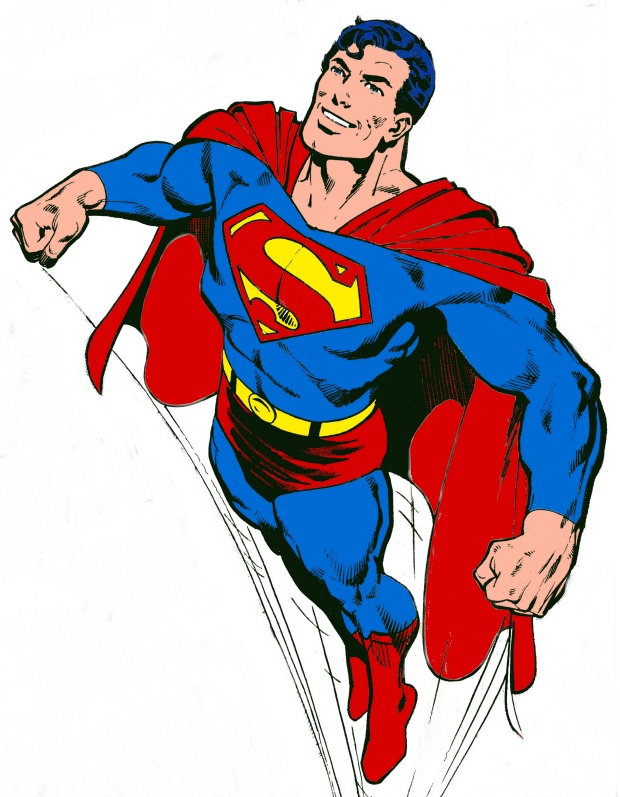
Where Are the Heroes? Part II

Where Are the Heroes? Part II
By: claycormany in Life in General
So where are the heroes? If we don’t care that they’re fictitious, pop culture offers plenty of them. The beauty of make-believe heroes is they never fail. The Joker may temporarily put Batman in a jam, but the Caped Crusader will eventually escape and bring the grinning miscreant to justice; kryptonite may disable Superman, but with a bit of luck, that power-stealing substance will be knocked away in time for the Man of Steel to regain his strength and save the day. Some make-believe heroes are rather simplistic, but others face the same issues that real people do, making it easy for us to identify with them. For example, Bruce Wayne, Batman’s alter ego, struggles with deep-seated grief over his parents’ murder. The young Clark Kent longs for a normal life but knows that’s not possible. Meanwhile, X-Men Wolverine and Cyclops vie for the affection of Jean Grey, even as they and their fellow mutants face fear and rejection from an intolerant society.
But when all is said and done, the power of pop culture heroes is restricted to comic books, TV shows, and movie screens. A few — Wonder Woman comes to mind — can inspire us, embolden us, give us confidence. But none can capture criminals or rescue the innocent, because they aren’t really there.
What about finding heroes in our history? Their acts of heroism are established facts. Through letters, diaries, public records, biographies, artworks, and a wealth of other sources, we can be enriched by the accomplishments and sacrifices of historic heroes. Better still, we know that their heroic deeds — unlike those of pop culture heroes — are authentic. The quality of our own lives may be impacted by what they did. But authentic heroes often have authentic flaws that may call their heroic qualities into question. That is all the more likely to occur when 21st century values are applied (perhaps unfairly) to heroes of the past.
When I was in elementary school 55-60 years ago, Christopher Columbus was an undeniable hero. The “discoverer” of America was revered for his boldness, perseverance, and navigational skill. Songs glorified him; history books lauded him; a holiday in October commemorated the day he sighted land in the New World. Today, Columbus’s heroism is tarnished perhaps beyond repair by charges that he exploited Tanio tribesmen, even to the point of torturing and enslaving them. Other heroes from American history face similar challenges to their character. Washington and Jefferson owned slaves; Andrew Jackson mistreated Native Americans; Theodore Roosevelt was an avid trophy hunter; FDR forced Asian Americans into internment camps, John F. Kennedy was unfaithful to his wife. Even Abraham Lincoln, regarded by many as America’s greatest President, made the preservation of the union a higher priority during the Civil War than the abolition of slavery. So, clearly, if we are to find heroes in America’s past, we need to decide if the transgressions and indiscretions of those heroes can be overlooked or at least forgiven.
Perhaps the easiest way to find heroes is to look for them closer to home — within our families, neighborhoods, and communities. Alice sees heroic qualities in her parents, who immigrated from Pre-WWI Poland, “which held no promise of opportunity.” Her mother and father, she notes, “still did not get the education they craved, but through hard manual labor made sure that all four children got it. There must be many more like them.” I would like to think that my great-grandfather, George Washington Cormany, was a hero, too. He fought for the North during the Civil War and apparently was wounded at the Battle of Stones River in Tennessee. His sword, complete with its worn-out scabbard, hangs on my parlor wall today. Like Alice’s parents, George W. Cormany was a low-profile hero. He didn’t make headlines or change the world in a dramatic way, but he did what was right and left a positive legacy for his descendants.
Today, there are low-profile heroes all around us. My friend and former Department of Education colleague Patty Huston-Holm has done some amazing work helping impoverished Ugandans come to the U.S. to receive a college education. She has also promoted the efforts of Ugandan artisans. Other people provide volunteer services at VA hospitals, food banks, and nursing homes; they build houses for Habitat for Humanity, deliver dinners to the sick for Meals on Wheels, and make sure the homeless receive medical care. They preserve historic sites, help schoolchildren with homework, and take gifts to low-income families on Christmas day. In thousands of ways that draw little attention, our home-grown low-profile heroes make the world a better place, sometimes at considerable cost to themselves. Best of all, you don’t have to look in a comic book or history text to find them. They might just be right next door.
Tags: Columbus, hero, history, pop culture


There are many unsung heroes willing to endure scorn, humiliation and even physical abuse to oppose injustice: suffragettes, gays who came out of the closet, those who opposed Vietnam war. They succeeded in forcing politicians who lacked their courage to eventually right a wrong
I agree the suffragettes were heroes, and perhaps some gay rights activists too. I have a harder time seeing Vietnam War protestors as heroes, but I’m open to persuasion.